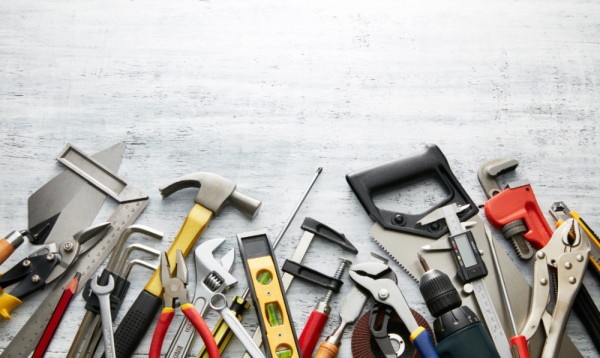Social Links Widget
Click here to edit the Social Media Links settings. This text will not be visible on the front end.
Must Have Tools for Homeowners

When you own your home, things are going to break and, unless you want to spend your money on visits from a neighborhood handyman, you’re going to need to fix them yourself. Luckily, you don’t need an arsenal of tools to handle most home maintenance fixes. These five tools will cover most of your basic projects.

- Cordless drill. A cordless drill is a must-have for installing cabinets, drawer pulls, hinges, picture frames, shelves and hooks, and more. Whether it’s for do-it-yourself projects or repairs, you’ll use your cordless drill just about every month.
- Drain cleaners. Shower and bathroom sink drains are susceptible to clogs because of the daily buildup of hair and whisker clippings. You can use chemical clog removers like Drano, but they’re expensive and the lingering chemical scent is unpleasant. Instead, buy some plastic drain cleaners that can reach into the drain to pull out the clog of hair and gunk. You can purchase them on Amazon or at a local hardware store for a low price.
- Shop-vac. No matter how careful you are, spills and accidents will happen and there are some tasks that just can’t be handled with paper towels or a standard vacuum, like pet messes or broken glass.
- Loppers. Even the minimum amount of care for your landscaping will require some loppers to remove damaged branches, vines, thick weeds, and any other unruly plants in your yard.
- Flashlight. You’re going to want something a little more powerful than your iPhone flashlight when you’re in the crawlspace!
Modern Architecture in Moses Lake
I don’t know about you but the one thing that I wish Moses Lake had more of is Modern Architecture. There is something about the clean lines that speaks to my OCD. Looking through these articles and seeing all these beautiful homes make me wish we had a builder in town who did more modern homes. Are you a fan of clean lines or would you rather stick with the craftsman style?
Which Down Payment Strategy is Right For You?

You’ve most likely heard the rule: Save for a 20-percent down payment before you buy a home. The logic behind saving 20 percent is solid, as it shows that you have the financial discipline and stability to save for a long-term goal. It also helps you get favorable rates from lenders.
But there can actually be financial benefits to putting down a small down payment—as low as three percent—rather than parting with so much cash up front, even if you have the money available.
THE DOWNSIDE
The downsides of a small down payment are pretty well known. You’ll have to pay Private Mortgage Insurance for years, and the lower your down payment, the more you’ll pay. You’ll also be offered a lesser loan amount than borrowers who have a 20-percent down payment, which will eliminate some homes from your search.
THE UPSIDE
The national average for home appreciation is about five percent. The appreciation is independent from your home payment, so whether you put down 20 percent or three percent, the increase in equity is the same. If you’re looking at your home as an investment, putting down a smaller amount can lead to a higher return on investment, while also leaving more of your savings free for home repairs, upgrades, or other investment opportunities.
THE HAPPY MEDIUM
Of course, your home payment options aren’t binary. Most borrowers can find some common ground between the security of a traditional 20 percent and an investment-focused, small down payment. Your trusted real estate professional can provide some answers as you explore your financing options.
5 Negotiating Tactics that Backfire
Negotiation is a subtle art in real estate, but skilled negotiators can usually find some common ground that satisfies all parties. On the other hand, using the wrong negotiation tactics can sink a deal pretty quickly. Here are some negotiation tactics buyers (and real estate professionals) should avoid:
1. Lowball offers: Going far below market value when you make an offer damages your credibility as a buyer and can be insulting to the seller. The seller has a range in mind that they’ll accept, and if you’re not even approaching the low end of that range, they won’t even consider the offer.
2. Incremental negotiations: Don’t continue to go back to the seller with small increases in your offer ($1,000 or less). The constant back-and-forth can grow tiresome and lead the seller to consider other opportunities.
3. “Take it or leave it”: Try not to draw a line in the sand with your initial offer. The seller can get defensive and consider other offers if you immediately show that you’re unwilling to budge. Even if it’s true, don’t make a show of it.
4. Nitpicking after inspection: Obviously if inspection reveals a major issue, it should be factored into the final sale price. But insisting on a lower price for every minor repair can put negotiations in a stalemate.
5. Asking for more, more, more: Some buyers will request that the sellers throw in add-ons like furniture or appliances that weren’t included in the listing. Try to avoid giving the seller a reason to build up resentment and think that you’re being greedy.
Save
Buying A New Home

Moving into a new home is an exciting time, and you’re probably daydreaming about decor and paint schemes and new furniture. But before you get into the fun stuff, there are some basics you should cover first.
Change the locks
Even if you’re promised that new locks have been installed in your home, you can never be too careful. It’s worth the money to have the peace of mind that comes with knowing that no one else has the keys to your home. Changing the locks can be a DIY project, or you can call in a locksmith for a little extra money.
Steam clean the carpets
It’s good to get a fresh start with your floors before you start decorating. The previous owners may have had pets, young children, or just some plain old clumsiness. Take the time to steam clean the carpets so that your floors are free of stains and allergens. It’s pretty easy and affordable to rent a steam cleaner—your local grocery store may have them available.
Call an exterminator
Prior to move-in, you probably haven’t spent enough time in the house to get a view of any pests that may be lurking. Call an exterminator to take care of any mice, insects, and other critters that may be hiding in your home.
Clean out the kitchen
If the previous occupants wanted to skip on some of their cleaning duties when they moved out, the kitchen is where they probably cut corners. Wipe down the inside of cabinets, clean out the refriger ator, clean the oven, and clean in the nooks and crannies underneath the appliances.
ator, clean the oven, and clean in the nooks and crannies underneath the appliances.

 Facebook
Facebook
 Twitter
Twitter
 Pinterest
Pinterest
 Copy Link
Copy Link

